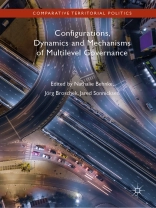This edited volume provides a comprehensive overview of the diverse and multi-faceted research on governance in multilevel systems. The book features a collection of cutting-edge trans-Atlantic contributions, covering topics such as federalism, decentralization as well as various forms and processes of regionalization and Europeanization. While the field of multilevel governance is comparatively young, research in the subject has also come of age as considerable theoretical, conceptual and empirical advances have been achieved since the first influential works were published in the early noughties. The present volume aims to gauge the state-of-the-art in the different research areas as it brings together a selection of original contributions that are united by a variety of configurations, dynamics and mechanisms related to governing in multilevel systems.
Inhoudsopgave
1 Introduction (N. Behnke, J. Broschek, J. Sonnicksen).- Part I Government, Governance and the State: Varied Modes of Coordination in Policy-making.- 2 Transformation of the State and Multilevel Governance (A. Benz).- 3 How Bureaucratic Networks Make Intergovernmental Relations Work: A Mechanism Perspective (N. Behnke).- 4 Governance Fatigue in Public Administration Discourse (W. Seibel).- 5 Cooperative Administration in Multilevel Governance Analysis (N. Dose).- Part II Coping with Complexities: Governance in Multilevel Systems.- 6 Policy-Making as a Source of Change in Federalism (D. Braun, J. Schnabel).- 7 National Parliaments as Multi-Arena-Players: A New Deliberative Role within the EU Multilevel System? (K. Auel).- 8 Intermediary Levels of Governance in Multilevel Systems (B. Egner).- 9 Bridging the Gap between the Local and the Global Scale? Taming the Wicked Problem of Climate Change through Trans-Local Governance (J. Kemmerzell).- 10 Multilevel Coordination in EU Energy Policy: A New Type of “Harder” Soft Governance? (M. Knodt).- 11 Soft Law Implementation in the EU Multilevel System: Legitimacy and Governance Efficiency Revisited (M. Hartlapp).- Part III Federalism and Democracy.- 12 The Ambivalence of Federalism and Democracy (S. Kropp).- 13 Popular Federalism for a Compound Polity? The Federalism of the Antifederalists and Implications for Multilevel Governance (D. Jörke, J. Sonnicksen).- 14 Multilevel Democracy: A Comparative Perspective (F. Scharpf).- 15 On Cross-Level Responsiveness in Multilevel Politics (E.-C. Hornig).- 16 Demoi-cracy: A Useful Framework for Theorizing the Democratization of Multilevel Governance? (A. Hurrelmann, J. De Bardeleben).- 17 Extending the Coupling Concept: Slack, Agency and Fields (J.E. Fossum).- Part IV Explaining Dynamics in Multilevel Systems.- 18 The Evolution of Legislative Power-sharing in the EU Multilevel System (K. Holzinger, J. Biesenbender).- 19 Hidden Power Shifts: Multilevel Governance and Interstitial Institutional Change in Europe (A. Héritier).- 20 Sub-Federal State-Building and the Origins of Federalism (G. Lehmbruch).- 21 Conclusion (A. Benz).
Over de auteur
Nathalie Behnke is Professor of Public Administration and Public Policy at the Institute for Political Science, TU Darmstadt, Germany.
Jörg Broschek is Canada Research Chair in Comparative Federalism and Multilevel Governance and Associate Professor of Political Science at Wilfrid Laurier University, Canada.
Jared Sonnicksen is Senior Researcher at the Institute for Political Science, TU Darmstadt, Germany.












